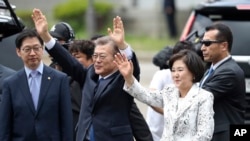Moon Jae-in has been sworn into office as president of South Korea, just one day after winning the presidential election by the widest margin of victory in the country’s history.
The early election was brought on by the impeachment of ex-President Park Geun-hye for her alleged involvement in a corruption scandal in which large family run conglomerates paid over $69 million to dubious foundations run by her close friend and associates in return for government favors.
WATCH: Video report of Moon Jae-in's inauguration
In his inauguration address at the National Assembly Wednesday, the liberal leader of the Democratic Party of Korea said he will lead by example to end government corruption.
“I will be a clean president. I come to my inauguration for president with nothing in my hands and I will step out with nothing in my hands. Later I will go back to my home and become an ordinary citizen,” said President Moon.
Because an un-elected acting government was put in place during the impeachment process, Moon was inaugurated with little fanfare just hours after the official election results were announced.
Checks and balances
On the domestic front, Moon said he will initiate political reforms to put checks and balances on the power of the presidency and crack down on illicit corporate practices. He has also promised to increase government spending on education and job creation while increasing taxes on the wealthy.
Moon won 13.4 million votes, 41 percent of the electorate, according to the National Election Commission. Overall 32 million votes were cast, making voter turnout in this election the highest in 20 years.
While the new president fell short of winning an outright majority, his closest competitor in a field of 13 candidates, conservative Liberty Korea Party candidate Hong Joon-pyo, won just 7.85 million votes, or 24.03 percent of the total number cast.
Moon’s party also does not have a clear majority in the National Assembly and will likely need help from the more centrist People’s Party that supported his presidential rival Ahn Choel-soo, who came in third with 21.5 percent of the votes.
U.S. alliance
On dealing with the North Korean nuclear threat, the new president and former human right lawyer said he is prepared to lead a major international diplomatic effort to search for a peaceful resolution to the increasingly tense security situation in the region.
“If needed I will fly directly to Washington. I will go to Beijing and Tokyo. And if conditions are met I will go to Pyongyang. In order to bring about peace and security on the Korean Peninsula I will do everything that I can,” he said.
Moon wants to increase dialogue and engagement with North Korea while also maintaining pressure and sanctions to encourage change. His position conflicts with that of U.S. President Donald Trump, who seeks to increase pressure on Pyongyang through further isolation and sanctions.
Moon has also been reluctant to support the deployment of the U.S. THAAD missile defense system, for which Trump recently demanded $1 billion in added defense costs. China has also opposed the advanced weapons system as a threat to the region and has retaliated against South Korea with limits on tourism and imports.
Moon has played down policy differences with Washington. Emphasizing the importance of the U.S. alliance with South Korea he has expressed confidence that Seoul and Washington ultimately want the same thing, to bring North Korea to the negotiating table to peacefully resolve the nuclear threat.
However North Korea analyst Katharine Moon, with the Center for East Asia Policy Studies at Brookings Institution, said the new South Korean president’s “good cop” unconditional engagement polices would likely only appease Pyongyang while undermining Washington’s stepped up efforts to persuade China to increase sanctions.
“It doesn’t hurt to have a good cop, bad cop when you’re dealing with a very tough opponent, which North Korea is. But we are not in an ideal world situation in politics, and the times right now don’t call for that much of a good cop frankly,” said Professor Moon.
World reactions
The White House has released a statement congratulating the newly elected South Korean president, saying the U.S. looks forward to working with Moon to strengthen the alliance and “deepen the enduring friendship and partnership between our two countries.”
Chinese President Xi Jinping and Japanese Prime Minister Shinzo Abe also congratulated Moon on Wednesday. Xi said China was willing to handle disputes with South Korea "appropriately" on the basis of mutual trust and understanding.
Abe said in a statement he looked forward to working with Moon to improve bilateral relations, describing Seoul as one of Japan's "most important" regional neighbors.
Youmi Kim in Seoul contributed to this report.







